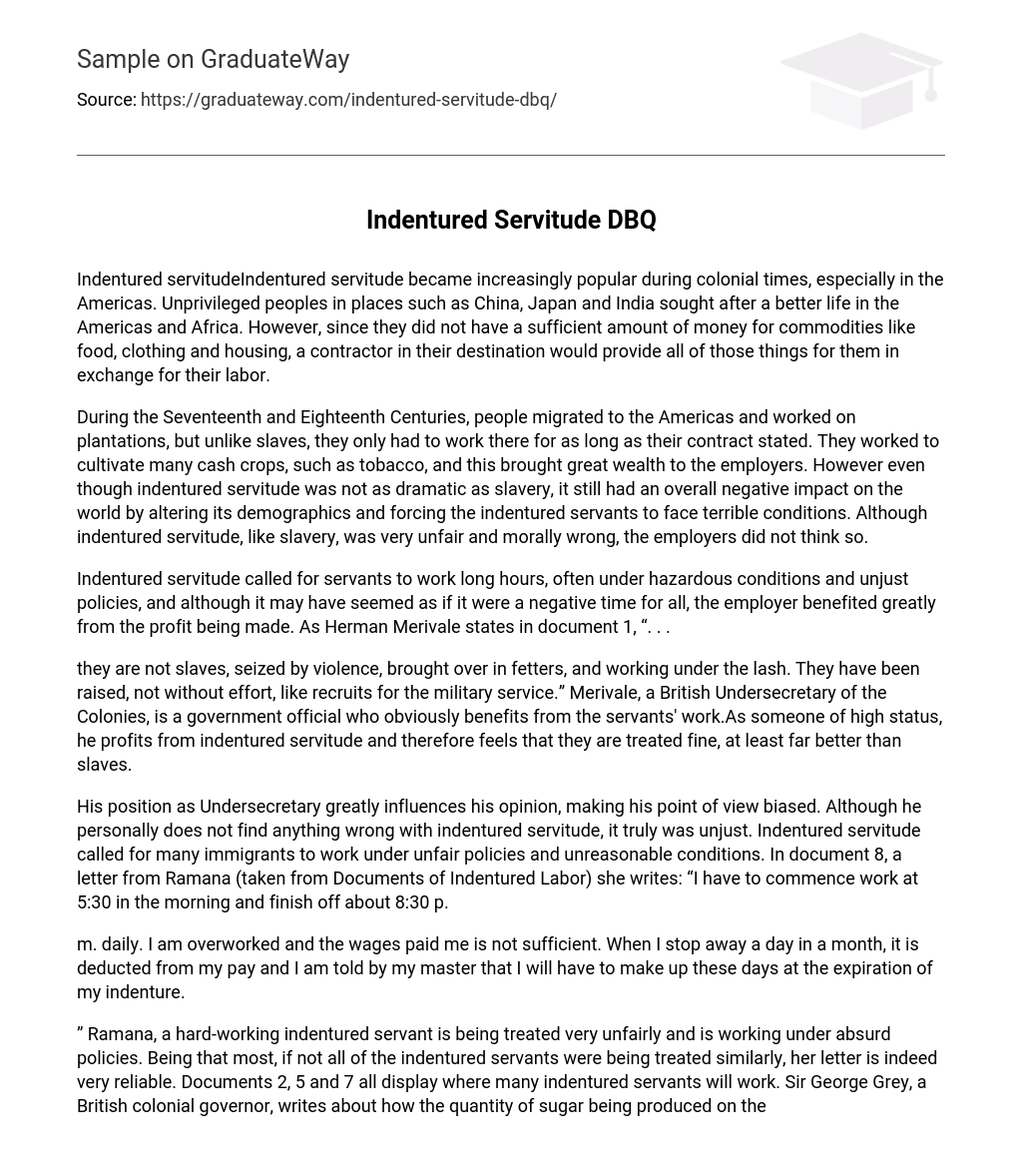Indentured servitudeIndentured servitude became increasingly popular during colonial times, especially in the Americas. Unprivileged peoples in places such as China, Japan and India sought after a better life in the Americas and Africa. However, since they did not have a sufficient amount of money for commodities like food, clothing and housing, a contractor in their destination would provide all of those things for them in exchange for their labor.
During the Seventeenth and Eighteenth Centuries, people migrated to the Americas and worked on plantations, but unlike slaves, they only had to work there for as long as their contract stated. They worked to cultivate many cash crops, such as tobacco, and this brought great wealth to the employers. However even though indentured servitude was not as dramatic as slavery, it still had an overall negative impact on the world by altering its demographics and forcing the indentured servants to face terrible conditions. Although indentured servitude, like slavery, was very unfair and morally wrong, the employers did not think so.
Indentured servitude called for servants to work long hours, often under hazardous conditions and unjust policies, and although it may have seemed as if it were a negative time for all, the employer benefited greatly from the profit being made. As Herman Merivale states in document 1, “. . .
they are not slaves, seized by violence, brought over in fetters, and working under the lash. They have been raised, not without effort, like recruits for the military service.” Merivale, a British Undersecretary of the Colonies, is a government official who obviously benefits from the servants’ work.As someone of high status, he profits from indentured servitude and therefore feels that they are treated fine, at least far better than slaves.
His position as Undersecretary greatly influences his opinion, making his point of view biased. Although he personally does not find anything wrong with indentured servitude, it truly was unjust. Indentured servitude called for many immigrants to work under unfair policies and unreasonable conditions. In document 8, a letter from Ramana (taken from Documents of Indentured Labor) she writes: “I have to commence work at 5:30 in the morning and finish off about 8:30 p.
m. daily. I am overworked and the wages paid me is not sufficient. When I stop away a day in a month, it is deducted from my pay and I am told by my master that I will have to make up these days at the expiration of my indenture.
” Ramana, a hard-working indentured servant is being treated very unfairly and is working under absurd policies. Being that most, if not all of the indentured servants were being treated similarly, her letter is indeed very reliable. Documents 2, 5 and 7 all display where many indentured servants will work. Sir George Grey, a British colonial governor, writes about how the quantity of sugar being produced on the plantations by natives is not merely enough and that indentured servants will soon help cultivate 100,000 tons of sugar annually (doc.
2). Document 5 consists of two photographs on indentured servants – one of them showing them waiting to work, and the other showing three of them actually working. Both show how tedious and uncomfortable the work is and how it is surprisingly similar to slavery. Lastly, as stated in the British Guiana Indenture Agreement, servants will have to work seven hours a day, all week except for Sunday, and healthy men shall receive one shilling for each day’s worth (doc.
7).The conditions and nature of their labor is ridiculous and completely unreasonable. All three documents depict that most, if not all, indentured servants will work in plantations cultivating cash crops for the profit of their “masters”. They are all being paid unreasonable wages for long hours of work; therefore an indentured servant’s diary, depicting how terrible conditions and policies she dealt with would support this even further by showing how indentured servitude was morally incorrect, and impacted the world negatively.
An effect that indentured servitude has had on the world is demographic alteration. Many people migrated to places such as the Americas, Africa, and the Polynesian islands, and these migrations caused somewhat of an imbalance in the world. Documents 4 and 6 are charts displaying the populations of certain peoples in places such as India, Guiana, Trinidad, and Mauritius. Document 4 displays the numbers, in thousands, of people who migrated from India, China and Japan, while Document 6 shows the population of peoples in Mauritius, a popular location of indentured servitude.
Both documents show us that indentured servitude took a toll on demographics in many areas and that in certain locations, like Mauritius, most of the population consisted of indentured servants and former slaves.This global disparity is certainly a negative impact. Documents 3 and 9 also show population changes, but they show where many of the migrants traveled to. Document 3, a map, shows that many of the servants traveled to Hawaii, Fiji, Cuba, Peru, Trinidad and West Africa, and document 9 shows that most of the indentured servants traveled to Mauritius.
These documents also display the population alteration in many places and how certain places, such as Mauritius may be now suffering from overpopulation, and countries such as China may be coping with a poor economy due to all of the vacant jobs; therefore, the ‘Jobs Wanted’ section of a Chinese newspaper during this time might further support my thesis by showing how many jobs were empty due to the massive decrease in the country’s population. Indentured servitude has had an overall negative impact on the world. Although the employers benefited from their work, everyone else suffered from it and this had a definite impact on the world. Many jobs were probably vacant in countries such as Japan, China and India, and this probably took a toll on their economy.
Although indentured servitude was the alternative to slavery, it had a somewhat equally negative global impact.





